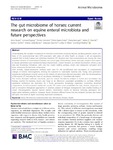The gut microbiome of horses: current research on equine enteral microbiota and future perspectives
Kauter, Anne
Epping, Lennard
Semmler, Torsten
Antao, Esther-Maria
Kannapin, Dania
Stoeckle, Sabita D.
Gehlen, Heidrun
Lübke-Becker, Antina
Günther, Sebastian
Wieler, Lothar H.
Walther, Birgit
Understanding the complex interactions of microbial communities including bacteria, archaea, parasites, viruses and
fungi of the gastrointestinal tract (GIT) associated with states of either health or disease is still an expanding
research field in both, human and veterinary medicine. GIT disorders and their consequences are among the most
important diseases of domesticated Equidae, but current gaps of knowledge hinder adequate progress with respect
to disease prevention and microbiome-based interventions. Current literature on enteral microbiomes mirrors a vast
data and knowledge imbalance, with only few studies tackling archaea, viruses and eukaryotes compared with
those addressing the bacterial components.
Until recently, culture-dependent methods were used for the identification and description of compositional
changes of enteral microorganisms, limiting the outcome to cultivatable bacteria only. Today, next generation
sequencing technologies provide access to the entirety of genes (microbiome) associated with the microorganisms
of the equine GIT including the mass of uncultured microbiota, or “microbial dark matter”.
This review illustrates methods commonly used for enteral microbiome analysis in horses and summarizes key
findings reached for bacteria, viruses and fungi so far. Moreover, reasonable possibilities to combine different
explorative techniques are described. As a future perspective, knowledge expansion concerning beneficial
compositions of microorganisms within the equine GIT creates novel possibilities for early disorder diagnostics as
well as innovative therapeutic approaches. In addition, analysis of shotgun metagenomic data enables tracking of
certain microorganisms beyond species barriers: transmission events of bacteria including pathogens and
opportunists harboring antibiotic resistance factors between different horses but also between humans and horses
will reach new levels of depth concerning strain-level distinctions.
Files in this item

